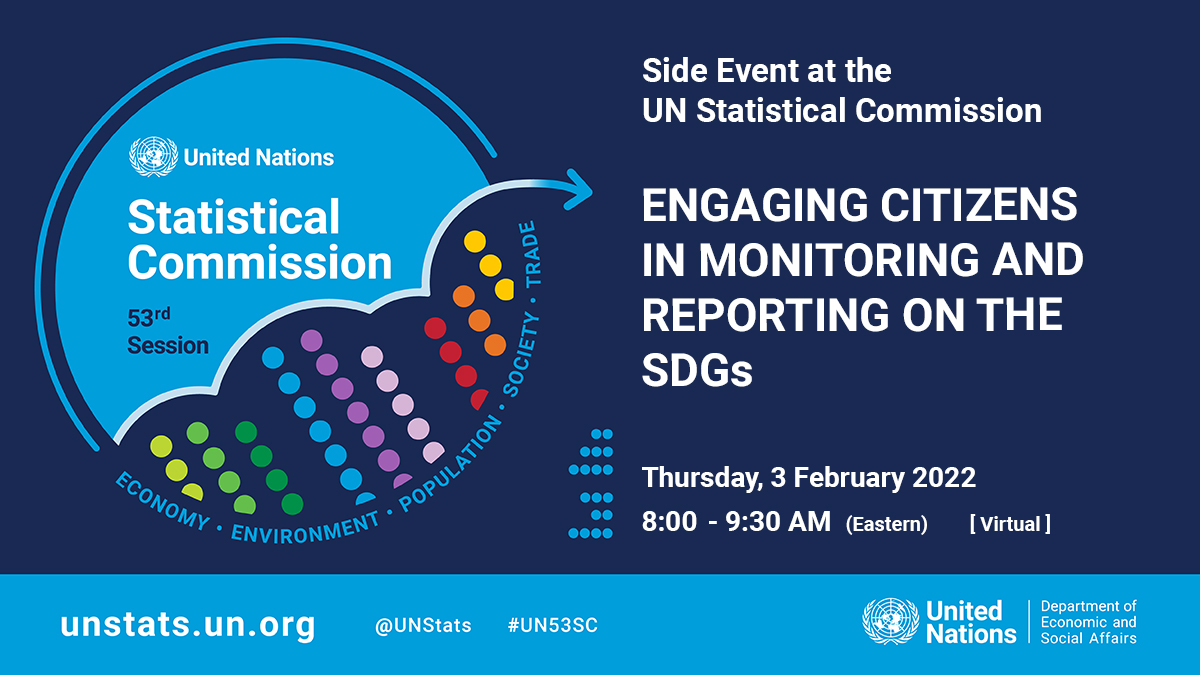United Nations Statistical Commission
Overview 53rd Session (2022) Side Events

Concept Note
More than six years in the implementation of the 2030 Agenda and despite improvements, big data gaps still exist in all areas of the SDGs in terms of geographic coverage, timeliness and the level of disaggregation required. Intensified efforts need to be made to fill those gaps. The Agenda asks that follow-up and review processes at all levels should be open, inclusive, participatory and transparent for all people and support the reporting by all relevant stakeholders. Therefore, the successful implementation and monitoring of the agenda needs the engagement of citizens, with particular attention to the voices of the poorest and most vulnerable.
Data produced by citizens have become an important source for scientific knowledge production and for informing policies and monitoring, including on the SDGs. These data can also help mobilize action, raise awareness on the world’s most pressing social, environmental and economic challenges, and include citizens in public decision-making. Engagement of citizens in various stages of data production also helps improve transparency, accountability and effectiveness of public institutions.
There are various ways of engaging citizens in data collection and research, which are influenced by social, political, economic, cultural and geographic factors, and scientific disciplines. This context-specific nature of citizen engagement in data and knowledge production has led to the development of various terms and definitions in the field, such as crowdsourcing, community-based monitoring, volunteered geographic information, participatory mapping, participatory action research, citizen-generated data, and citizen science, among others. The question is how to harness the potential of this data source to address the SDG data gaps and needs and how to integrate them into official statistics in a sustainable way.
This side event will discuss the potential of data produced by citizens for SDG monitoring and reporting. It will provide examples of where citizen data are contributing and could contribute to the SDG processes based on the national and international experiences. It will also highlight the challenges of integrating these data into official statistics and policy processes and present best practices of how partnerships can be created for data to contribute to the SDGs. Most importantly, the session will highlight the issues regarding the terminology, definitions, quality, and standards related to the data produced by citizens and how they can be overcome to address the needs of the official data and statistics communities to work with data produced by citizens.
Organized by: United Nations Statistics Division, Ghana Statistical Service, World Health Organization, and International Institute for Applied Systems Analysis
Agenda
-
1. Welcome and introduction to the side event,
- Ms. Francesca Perucci, Assistant Director, UN Statistics Division
-
a. Ms. Yongyi Min,
Chief of SDG Monitoring Section, and Ms. Haoyi Chen, Coordinator of Intersecretariat Working Group on Household Surveys, UN Statistics Division
b. Mr. Omar Seidu, Head of Demographic Statistics & SDG Coordinator, Ghana National Statistical Service
c. Mr. Steve MacFeely, Director of Data and Analytics, World Health Organization
d. Ms. Dilek Fraisl, Research Scholar, International Institute for Applied Systems Analysis
e. Ms. Rose Oluoch, Programme Manager, SDGs Kenya Forum